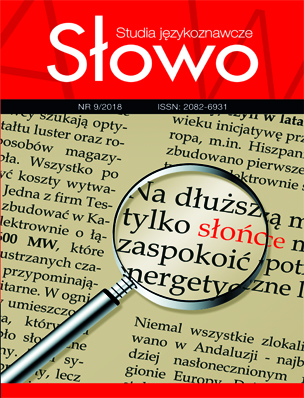Zapożyczenia niemieckie w śląskim profesjolekcie górniczym przyswojone na gruncie gwarowym
DOI:
https://doi.org/10.15584/slowo.2018.9.11Słowa kluczowe:
mining profession, Upper Silesia, Silesian dialect, German borrowings, phonetic, morphological, inflexive adaptations, hybrids, GermanismsAbstrakt
The subject of research in this study are German borrowings, which constitute the largest (over 46%) share in the Upper Silesian mining sociolect. The German vocabulary on the basis of the Silesian dialect underwent a comprehensive assimilation to the Polish grammatical system, enriching the vocabulary of the studied sociolect. Attention is drawn to the characteristic acquisition to the Silesian phonetic and morphological system. The loans in the field of morphology are accompanied by various word-formation processes – interesting derivatives are derived from borrowings, as well as derivatives motivated by German basics, created using native (often characteristic dialect) formants. Among German loans, there are also inflections on Polish (dialectal) ground – German nouns adapt to native varieties of paradigms. The article also presents characteristic assemblies created on the basis of the Silesian dialect and interesting adaptations of German compositos, which have strongly grown into the dialect of Silesia as translations of German or assimilated as specific hybrids. Borrowings are often accompanied by semantic changes (narrowing, specialization of meanings or their shifting). The analysis of the material in this sketch proves that the Germanisms in the Silesian dialect paradoxically refer to its Polishness, which can be seen in the degree of their adaptation to the Polish (dialectic) pronunciation – the entire grammatical system.Downloads
Bibliografia
Chodera J., Kubica S., 1984, Podręczny słownik niemiecko-polski, Warszawa.
Czajkowski A., 1994, Słownik gwary śląskiej, Katowice [skrót: SGśl].
Cząstka-Szymon B., Ludwig J., Synowiec H., 2000, Mały słownik gwary Górnego Śląska, cz. I, wyd. drugie poszerzone i poprawione, Katowice [skrót: SGśl].
Ćmała B., Porwoł P., Wieczorek W., 1985, Wypisy do dziejów Rybnika i Wodzisławia Śląskiego, Opole.
Dubisz S. (red.), 2006, Uniwersalny słownik języka polskiego PWN, Warszawa.
Gajda S., 1976, Górnicze „wyrobisko”. Z badań nad grupą leksykalno-semantyczną słownictwa górniczego, „Język Polski”, z. 4, s. 264–274.
Gajda S., 1976a, Rozwój polskiej terminologii górniczej, Opole.
Gajda S., 1977, Analiza leksykalno-semantyczna górniczej leksyki specjalnej (obudowa i transport), „Zeszyty Naukowe Wyższej szkoły Pedagogicznej w Opolu. Językoznawstwo” VI, Opole s. 105–120.
Gisman S., 1949, Słownik górniczy, Katowice.
Grzegorczykowa R., Puzynina J., 1979, Słowotwórstwo współczesnego języka polskiego, Warszawa.
Koch Z. (red.), 1983, Słownik naukowo-techniczny niemiecko-polski, t. 1–2, Warszawa [skrót: SNT].
Korbut G.,1935, Niemczyzna w języku polskim, Warszawa.
Kowalska A., 1982, Zróżnicowanie socjolektalne polszczyzny górnośląskiej w II połowie XIX wieku, „Socjolingwistyka”, t. 4, Warszawa, s. 141–152.
Leksykon górniczy, 1989, red. zbiorowa, Katowice [skrót: L].
Lichtenstein H., 1871, Słownik górniczy niemiecko-polski, Lwów.
Lubaś W., 1987, Kontakty językowe polsko-niemieckie na poziomie tekstu. Uwagi metodologiczne. Elementy niemieckie w miejskim języku przemysłowego Górnego Śląska [w:] Deutsch- Polnische- Sprachkontakte. Beiträgezur Gleichnamigen Tagung 10–13. April 1984 in Göttingen. Herausgegeben von Alek Pohl und A. de Vincenz, Böhlau Verlag Köln Wien, s. 131–153.
Nagórko A., 2007, Zarys gramatyki polskiej, Warszawa.
Nagórko A., Budzyńska A., 1971, Formanty sufiksalne pochodzenia germańskiego i romańskiego w polszczyźnie dawnej i dzisiejszej, „Językoznawca” nr 23/24, Lublin, s. 5–16.
Najberg M., Lubert J., 1969, Słownik górniczy (znormalizowane nazwy i określenia), Warszawa.
Piprek J., Ippoldt J., 1990, Wielki słownik niemiecko-polski, t. 1–2, Warszawa.
Piprek J., Ippoldt J., 1992, Wielki słownik polsko-niemiecki, t. 1–2, Warszawa.
Rudnicka-Fira E., 2008, O germanizmach w języku mówionym mieszkańców miast śląskich raz jeszcze (na przykładzie Rybnickiego Okręgu Przemysłowego) [w:] Miasto. Przestrzeń zróżnicowana językowo, kulturowo i społecznie, red. M. Święcicka, Bydgoszcz, s. 147–162.
Rudnicka-Fira E., 2011, Jeszcze o profesjonalizmach górniczych (neosemantyzmy) [w:] Odmiany stylowe polszczyzny – dawniej i dziś, red. U. Sokólska, Białystok, s. 253–264.
Rudnicka-Fira E., 2013, Germanizmy w śląskim profesjolekcie górniczym, „Miscellanea Slavica Monasteriensia”. Gedenkschriftfűr Gerhard Birkfellner, gewidmet von Freuden, Kollegen und Schülern. Hg. v. Bernhard Symanzik, Berlin, s. 433–446.
Rudnicka-Fira E., 2017, Profesjolekt górniczy w dobie przemian cywilizacyjnych (morfologiczne i syntaktyczne sposoby jego wzbogacania) [w:] Socjolekt – idiolekt – idiostyl. Historia i współczesność, red. U. Sokólska, Białystok, s. 273–288.
Szymczak M. (red.), 1978–1981, Słownik języka polskiego, t. 1–3, Warszawa.
Tambor J., 1998, Germanizmy w gwarze śląskiej – stopień przyswojenia, „Prace Językoznawcze”, t. 25: Studia historycznojęzykowe, red. O. Wolińska, Katowice.
Witaszek-Samborska M.,1993, Zapożyczenia z różnych języków we współczesnej polszczyźnie (na podstawie słowników frekwencyjnych), Poznań.
Wilkoń A., 1987, Typologia odmian językowych współczesnej polszczyzny, Katowice.
Wilkoń A., 1988, Typologia socjolektów, „Socjolingwistyka”, t. 8, Wrocław.
Zaręba A., 1966, Polskość Śląska w świetle słownictwa, „Język Polski” XLVI, z. 2, s. 85–94.
Zaręba A., 1974, Śląsk w świetle geografii językowej, Wrocław–Warszawa–Kraków–Gdańsk.
Pobrania
Opublikowane
Jak cytować
Numer
Dział
Licencja
Prawa autorskie (c) 2018 Słowo. Studia językoznawcze

Utwór dostępny jest na licencji Creative Commons Uznanie autorstwa – Użycie niekomercyjne 4.0 Międzynarodowe.


